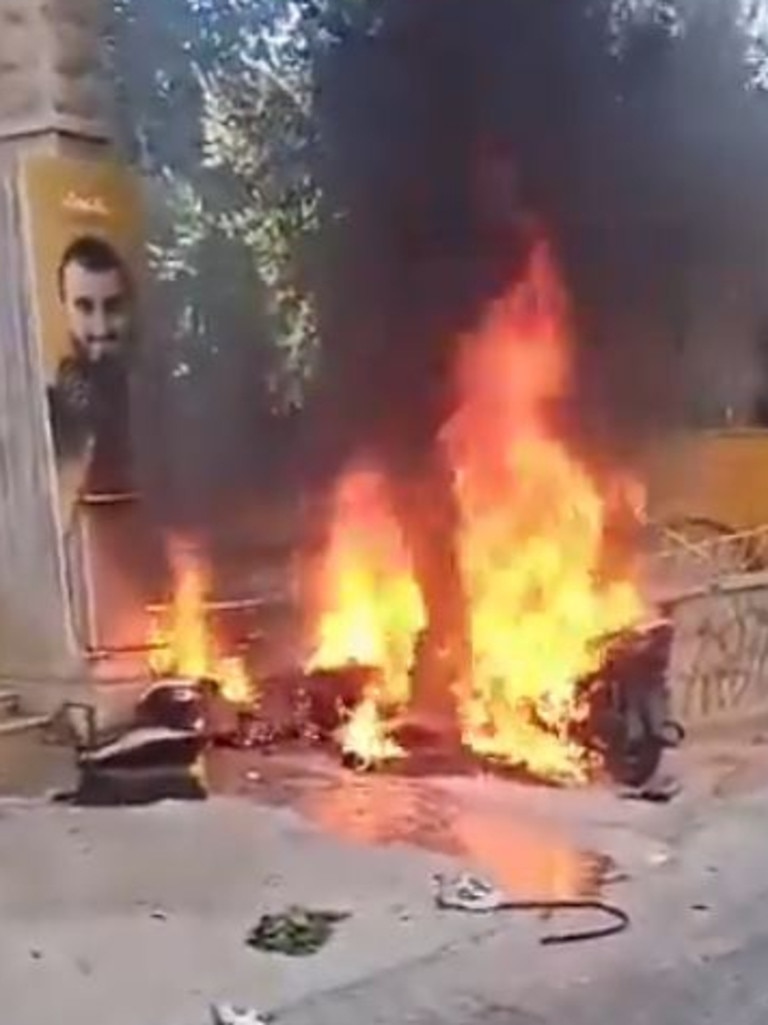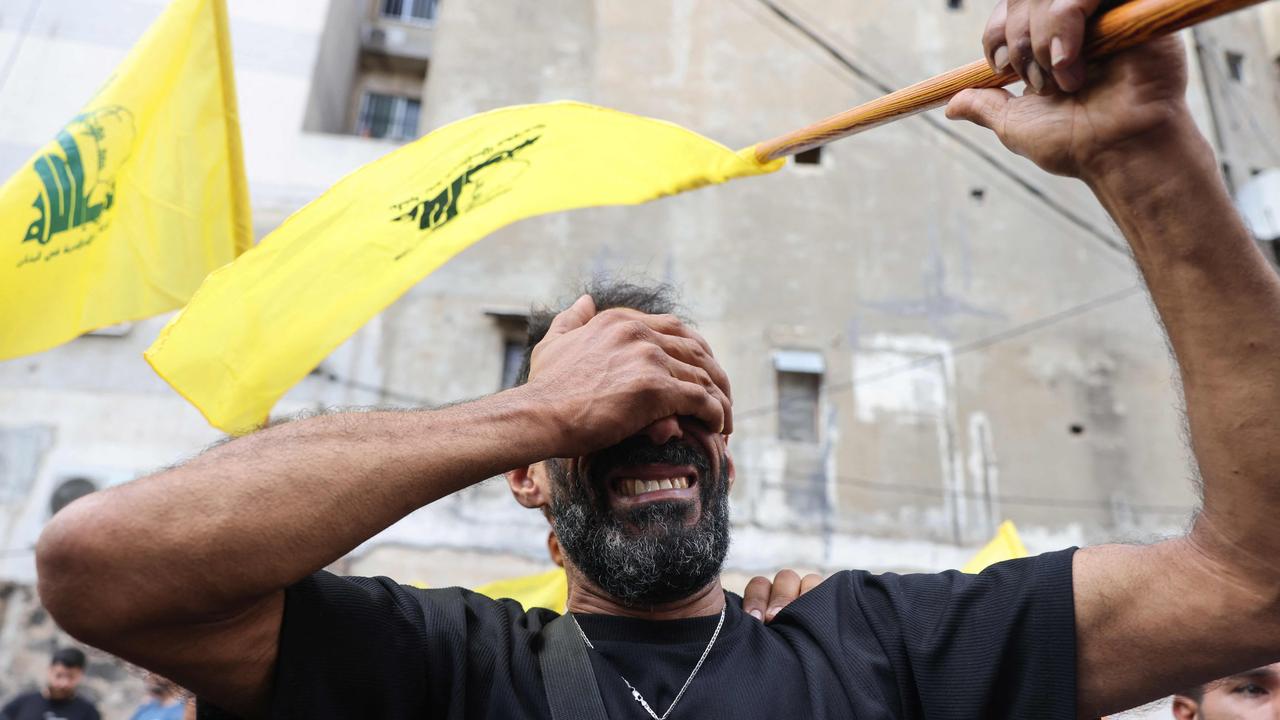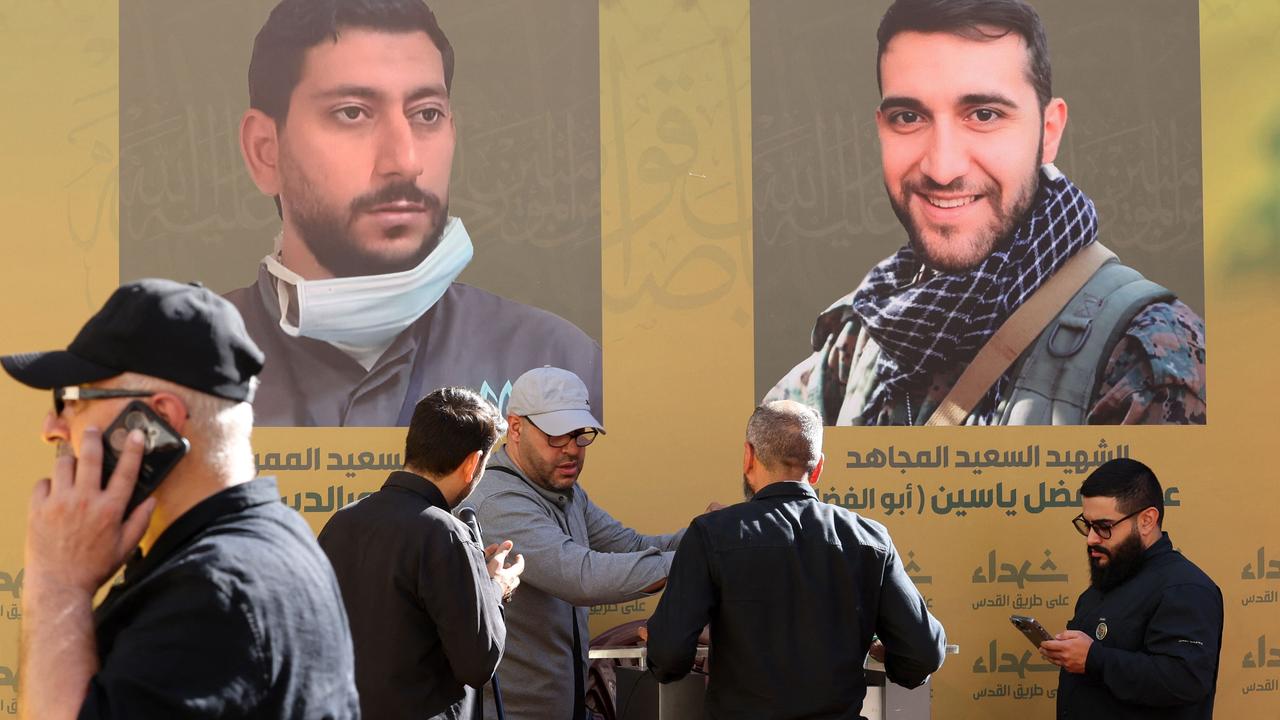‘Compelled to respond’: Horror war prediction as Middle East explodes over Hezbollah attacks
The Middle East is on a knife edge as a second wave of explosions threatens to engulf the region – and the wider world – into all-out war.
Hezbollah has suffered a body blow.
Many of its key members are dead or wounded. Its fighters cannot trust technology any longer. And its credibility is in tatters.
But Israel, widely suspected of the attacks, may have harmed its own reputation in the process.
The audacious attack using remotely detonated walkie-talkies and personal pagers has killed at least 32 people and injured some 3500 across Lebanon over the past two days.
Hezbollah blames Israel for the attacks, though Israel has not commented.
Advocates argue the strike was unprecedented in its precision targeting and impact on Hezbollah’s terrorist command network.
Others argue Hezbollah is more than just a militant organisation. It also has political, medical, charity and social work personnel – all of whom may have also used the devices.
But analysts agree Tuesday night’s events represent a turning point in the conflict.
According to @ynetnews, at least 450 members of Hezbollah's Radwan Unit members were injured in the communication device explosions across Lebanon. In 2022, @UANI spotted a Radwan member with a Icom IC-V82 walkie-talkie. https://t.co/TJsvKhRnt2pic.twitter.com/GvrEb5vQQY
— Christiaan Triebert (@trbrtc) September 18, 2024
Israel has not claimed responsibility for the attacks. But if responsible as has been alleged, Hezbollah’s remaining active commanders will feel compelled to respond with an equally dramatic act.
But is the Iranian proxy willing to be goaded into all-out war?
“Israel is changing the rules of the game, and its opponents have no effective means to respond that do not also escalate the conflict to the point that heavy damage (and US involvement) becomes likely,” says Eurasia Group analyst Gregory Brew.
Israel is changing the rules of the game and its opponents have no effective means to respond that do not also escalate the conflict to the point that heavy damage (and US involvement) becomes likely.
— Gregory Brew (@gbrew24) September 18, 2024
But embattled Prime Minister Benjamin Netanyahu faces an escalation on another front – international relations.
The United Nations General Assembly has overwhelmingly adopted a Palestinian-drafted resolution instructing Israel to cease “its unlawful presence in the Occupied Palestinian Territory” within 12 months. The vote was 124 nations in favour, 14 against and 43 abstentions (including Australia).
And Israel’s eastern neighbour, Jordan, condemned the escalation – accusing Israel of driving the Middle East to the “brink of regional war”.
International opinion, however, has done little to restrain Netanyahu since his government was embarrassed by the surprise October 7 terror attack that killed 1139 people (695 Israeli civilians – 36 of which were children – as well as 373 security forces and 71 foreign nationals).
Now, his trouble-torn coalition of far-right parties is agitating to expand Israel’s war goals.
“The centre of gravity is moving northward,” Israeli Defence Minister Yoav Gallant said during a visit to an air base on Wednesday night.
“We are at the start of a new phase in the war. It requires courage, determination, and perseverance on our part. It is critical that we operate in close co-operation between the [military and security] organisations at all levels.
“Our task is clear – ensuring the safe return of Israel’s northern residents to their homes.”
Global fallout
Jordan’s foreign minister Ayman Safadi made his “brink of regional war” warning while addressing an Islamic and Arab meeting in Amman called to discuss the proposed Gaza ceasefire. He reiterated no peace would be possible without a two-state solution.


Turkey’s foreign ministry issued a statement warning that “the ongoing genocide in Gaza as well as settler violence against Palestinians and Israeli military attacks in the West Bank are alarming”.
“The international community must act as soon as possible to stop the Israeli attacks, which threaten the stability of our region and the international order, and to reduce tensions,” the statement reads.
Iran’s President Masoud Pezeshkian states: “The incident once again showed that Western nations and Americans fully support crime, killings and blind assassinations by the Zionist regime”.
And European Union foreign affairs chief Josep Borrell said: “I can only condemn these attacks that endanger the security and stability of Lebanon and increase the risk of escalation in the region”.
Combined with the UN General Assembly resolution, an international war crimes investigation and waning support among long-time allies (including Australia, the United Kingdom and the United States), Prime Minister Netanyahu risks unprecedented diplomatic isolation.
“Israel can no longer rely on raw military strength alone,” warns former head of strategy for the Israel Defence Force (IDF) Assaf Orion.
“It must use all the various tools of national power as well as the help of allies and partners – perhaps even of a coalition of forces. Such support would make it possible for Israel to mitigate some of its vulnerabilities.”
He says the power of such a coalition approach was demonstrated by the destruction of Iran’s missile and drone attack in April as they flew across much of the Middle East.
“The Israeli government has largely failed to address the legal and political dimensions of the war,” Orion writes.

“The more the war is prolonged, the more Israel faces political isolation and questions about the legitimacy of its operations, even as negative international views of the enemy camp – between Gaza and Tehran – remain fairly stable.”
Battle of morale and credibility
“Israel has now achieved complete intelligence domination over Hezbollah,” says Atlantic Council think-tank analyst Marc Polymeropoulos.
“In fact, this is the most impressive kinetic intelligence operation I can recall in my career. The scale and scope of it was just staggering.”
By killing and wounding so many members in a single strike, Polymeropoulos says Hezbollah has been brought to its knees and rendered virtually impotent.
“This likely will cause Hezbollah to undertake a brutal counterintelligence review, which may paralyse the group. No one will be trusted.
“In other words, by delivering a devastatingly stark and brutal warning to Hezbollah that it has totally compromised its security, Israel signifies to the group that a wider war would be disastrous.”
But his Atlantic Council colleague Jonathan Panikoff isn’t so certain.
“There is a very real potential that it could raise tensions further, and the operation absolutely could be a prelude to war,” Panikoff warns.

“It would not be a surprise to see a lot of the Hezbollah rank and file clamouring to respond. “But for Hezbollah to admit that these attacks were this wide of a counterintelligence failure would be bad for the group – not to mention dangerous to its survival.”
But Prime Minister Netanyahu also risks further damage to his leadership.
Human Rights Watch has called for a prompt and impartial investigation into the use of pagers as weapons of war.
“Customary international humanitarian law prohibits the use of booby traps – objects that civilians are likely to be attracted to or are associated with normal civilian daily use – precisely to avoid putting civilians at grave risk,” says director Lama Fakih.
West Point military academy researcher John Spencer disagrees.
“I cannot find a similar intelligence/military operation with such secrecy, lethality, ingenuity, audacity (and) impact … nothing so targeted (in its) lethal use of force, precise – proportionate and distinction,” he states.
1) Historic & unprecedented. I cannot find a similar intelligence/military operation with such secrecy, lethality, ingenuity, audacity, impact. While there have been other major intelligence operations in war (breaking Enigma, various spies inside governments) or surprise attacks…
— John Spencer (@SpencerGuard) September 18, 2024
But fellow West Point academic William Boothby argues Israel risked breaching international law by turning apparently harmless portable objects into bombs – and if it is shown a disproportionate number of civilians are among the victims.
“It was probably reasonable for those planning and conducting the operation to assume that pagers issued for military purposes would be in the possession of their military users at the time of detonation,” he writes.
“The targeting law concern will be more likely to centre on whether adequate consideration was given to the incidental injury and damage to be expected from these explosions.”
Jamie Seidel is a freelance writer | @JamieSeidel






